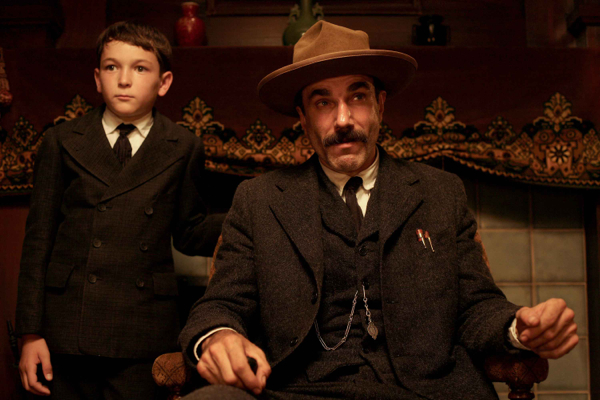Movie review by Greg Carlson
A staggering and singular piece of intimately personal storytelling that recalls many of the director’s adored 1970s period piece inspirations like “Days of Heaven,” “McCabe & Mrs. Miller,” and “Chinatown,” Paul Thomas Anderson’s “There Will Be Blood” is one of the year’s most memorable movie experiences. Despite acknowledging Upton Sinclair’s 1927 novel “Oil!” as its source material, Anderson uses the book merely as a jumping-off point, erasing most of Sinclair’s sprawling social and political tableaux as well as the literal-minded debates on war, Bolshevism, and labor unions. Instead, Anderson is concerned with the moral and mental decline of his central character, allegorically renamed Daniel Plainview (Daniel Day-Lewis), an unstable oil wildcatter who loses his sanity as he finds a fortune in the black gold of California in the first quarter of the 20th century.
Despite his proven skill as a director of large ensembles, Anderson also jettisons many of the novel’s supporting characters, ditching the businessman’s family to reshape Plainview as a completely isolated man. The movie suggests that Plainview adopts his son H.W. (Dillon Freasier) following the death of a worker killed in a drilling accident. Other alterations, principally the shift in focus from the son (the book’s central protagonist) to the father, allow Anderson the opportunity to pay complete attention to Plainview, who is artfully embodied by Day-Lewis in yet another sensational performance in a career full of them.
Anderson has always been wonderful with his performers, and Paul Dano, playing brothers Paul and Eli Sunday, is a perfect foil for Day-Lewis’ Plainview. Eli rises to prominence as a faith healer and minister in the Church of the Third Revelation, and the bitter rivalry that develops between the young preacher and the old oilman develops in a series of scenes of increasing intensity as the determined men try to outdo one another. Dano is not as accomplished a performer as Day-Lewis, but his calculating evangelist proves every bit as fascinating as Plainview, and their final scene together packs a punch that leaves many audience members reeling.
Jonny Greenwood’s brilliant, unsettling score rings out like nothing less than a herald of the apocalypse, and several of the movie’s scenes are rendered more frightening with Greenwood’s music as counterpoint to the images. Amidst all the Old Testament thundering, Anderson also takes time to remind his viewers that he has a sense of humor, although its inclusion in “There Will Be Blood” is as black as Plainview’s petroleum. Two favorites examples are Kevin O’Connor sharing the information that he is a “brother from another mother” and Day-Lewis slurping and bellowing “I drink your milkshake! I drink it up!”
“There Will Be Blood” has already been a critical success, and many writers have noted both the movie’s similarities to 1970s material (Anderson ends the movie with a dedication to Robert Altman) and its indebtedness to “The Treasure of the Sierra Madre” and “Citizen Kane.” The comparisons are apt, and by the conclusion of “There Will Be Blood,” it is clear that Anderson has proven himself a filmmaker of the first rank.
